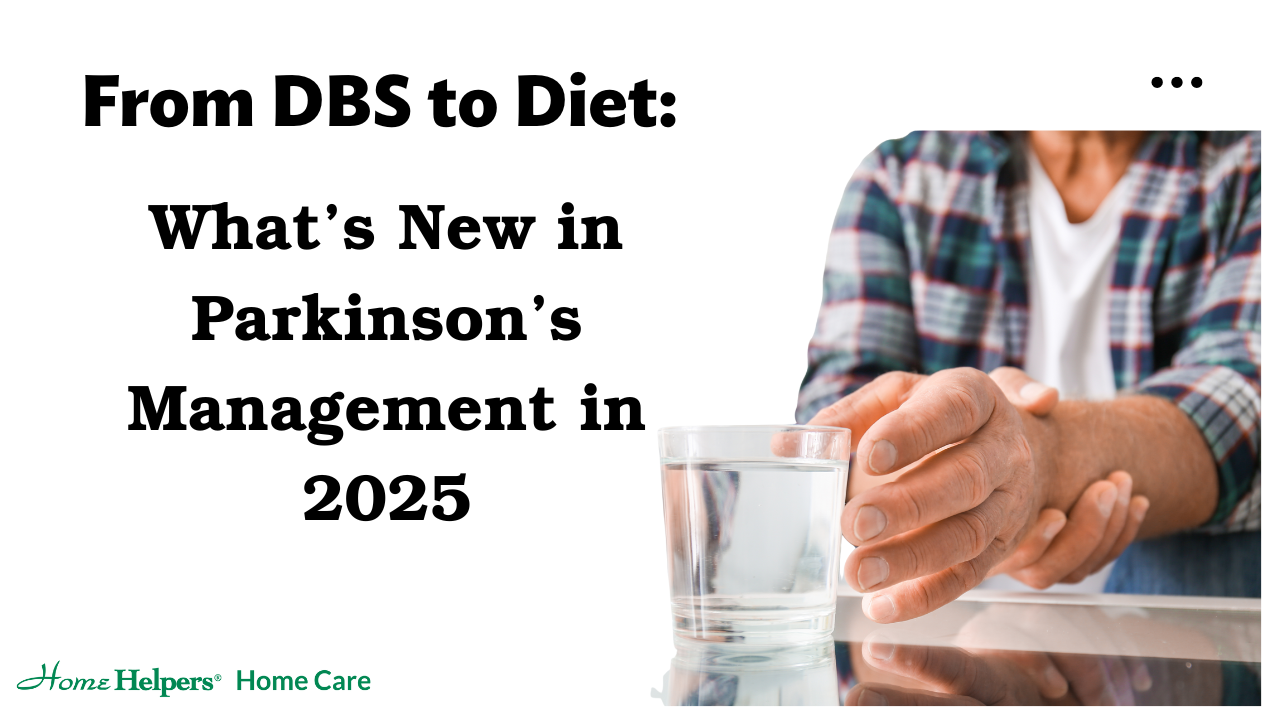From DBS to Diet: What’s New in Parkinson’s Management in 2025

Author: Home Helpers Martinsburg
Parkinson’s disease is a progressive neurological disorder that affects movement, balance, and cognitive function. As of 2025, new innovations are reshaping how families in the Martinsburg area manage Parkinson’s—from advanced medical devices to everyday changes in diet and care routines. These updates reflect a more holistic and personalized approach that supports both the individual and their caregivers.
1. Advancements in Deep Brain Stimulation (DBS)
Deep Brain Stimulation (DBS) is evolving. This year, adaptive DBS systems—now FDA-approved—adjust in real time based on the brain’s activity, leading to more precise symptom control.
- These closed-loop DBS devices help reduce side effects and lower the frequency of clinical reprogramming appointments (Fang et al., 2023).
- For individuals in our area who travel for care, these new devices offer greater independence and flexibility.
- DBS is no longer a “set-it-and-forget-it” treatment—it now works with the brain, not just on it.
2. Nutrition’s Expanding Role in Parkinson’s Care
A growing body of research in 2025 shows that gut health and nutrition play a critical role in managing Parkinson’s symptoms. For seniors in Martinsburg and surrounding communities, a Mediterranean-style diet is now recommended for both cognitive and physical well-being.
- Nutritional strategies like timed protein intake can improve the effectiveness of medications like Levodopa (Cereda et al., 2023).
- Probiotics and prebiotics are gaining traction for their role in reducing inflammation and supporting neurological health (Zhou et al., 2024).
In-home caregivers from our Martinsburg team are trained to prepare meals and offer support aligned with physician-recommended diets.
3. Smart Devices and In-Home Monitoring
Technology is playing a bigger role in Parkinson’s care, especially for families managing the disease at home. Wearables and smartphone apps can now:
- Track tremors and movement issues in real time
- Send data to neurologists remotely
- Help patients with reminders, voice therapy, and daily routines
- Virtual reality (VR) is also being introduced for balance and gait training (Lee et al., 2024), helping reduce fall risks at home.
For families in Martinsburg, these tools can reduce travel time, increase safety, and support proactive care between appointments.
4. Treating the Emotional Side of Parkinson’s
While tremors and mobility issues are the most visible symptoms, emotional and cognitive symptoms often cause more distress.
- Anxiety, depression, and memory loss are being treated earlier and more aggressively with CBT, mindfulness, and medication adjustments.
- Updated care guidelines in 2025 recommend routine mental health screening from the time of diagnosis.
Our caregivers are trained to provide not just physical support but emotional companionship as well—an important part of Parkinson’s care.
5. Customized In-Home Care in Martinsburg
Home Helpers Home Care of Martinsburg provides personalized in-home support tailored for those with Parkinson’s. Our services evolve with your loved one’s needs, from early-stage mobility assistance to advanced memory care.
- Caregivers assist with medication routines, meal preparation, fall prevention, and motor skill exercises.
- Families receive guidance and respite care to avoid burnout and stay connected during every phase of the disease.
We understand the unique challenges Parkinson’s brings and are here to provide compassionate care every step of the way.
Final Thoughts
Whether your loved one is newly diagnosed or entering the later stages of Parkinson’s, the latest tools—from adaptive DBS to evidence-based nutrition—can make daily life more manageable and dignified. With support from Home Helpers Home Care of Martinsburg, you don’t have to face these changes alone.
Call us at (304) 433-8000 or visit homehelpershomecare.com/martinsburg to schedule a free in-home consultation today.
References
- Cereda, E., Barichella, M., Pedrolli, C., Klersy, C., Cassani, E., Caccialanza, R., & Pezzoli, G. (2023). Low-protein and protein-redistribution diets for Parkinson's disease patients with motor fluctuations: A systematic review. Nutrition Reviews, 81(1), 45–55. https://doi.org/10.1093/nutrit/nuad002
- Fang, H., Liu, Y., Zhang, J., & Wang, L. (2023). Closed-loop deep brain stimulation for Parkinson’s disease: A review of recent advances. Frontiers in Neurology, 14, 1159943. https://doi.org/10.3389/fneur.2023.1159943
- Lee, Y. S., Kim, J. S., & Yoo, S. W. (2024). Virtual reality-based balance training in Parkinson's disease: A randomized controlled trial. Journal of NeuroEngineering and Rehabilitation, 21(1), 11. https://jneuroengrehab.biomedcentral.com/articles/10.1186/s12984-024-01234-9
- Zhou, H., Yang, J., Yu, X., Zhang, X., & Qian, S. (2024). Gut microbiota and Parkinson's disease: New insights into pathogenesis and treatment. Frontiers in Aging Neuroscience, 16, 1312421. https://doi.org/10.3389/fnagi.2024.1312421
